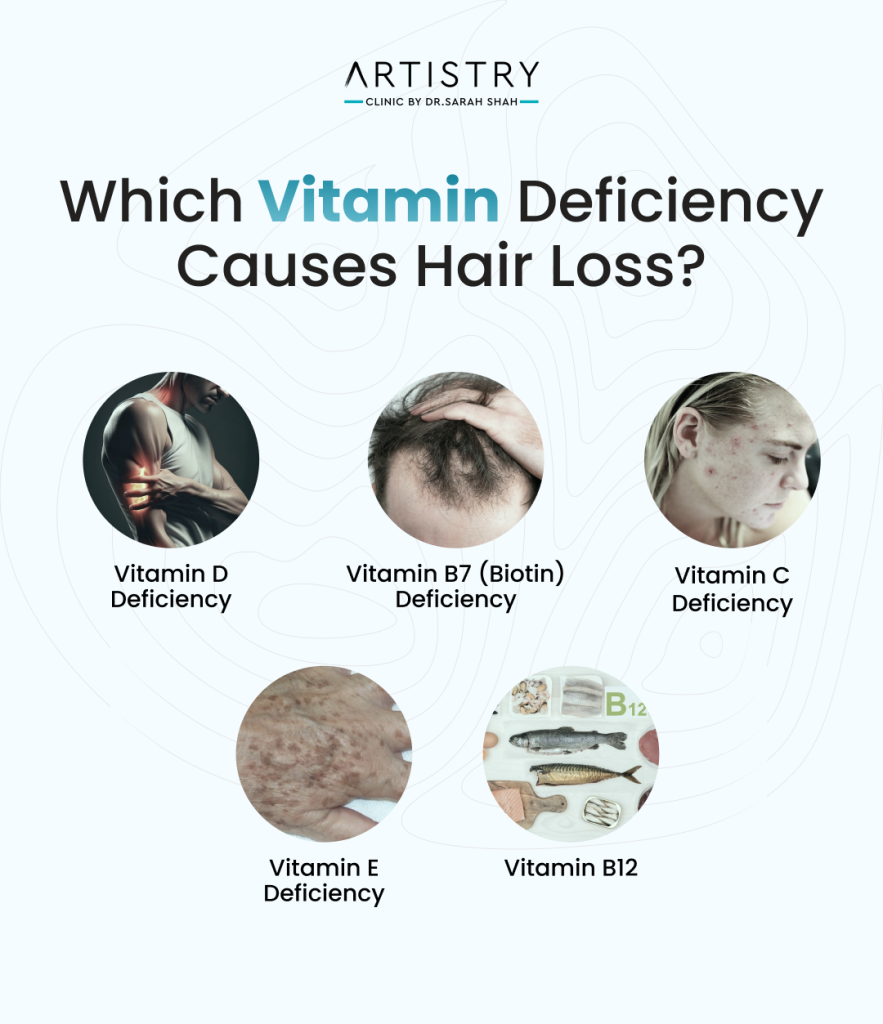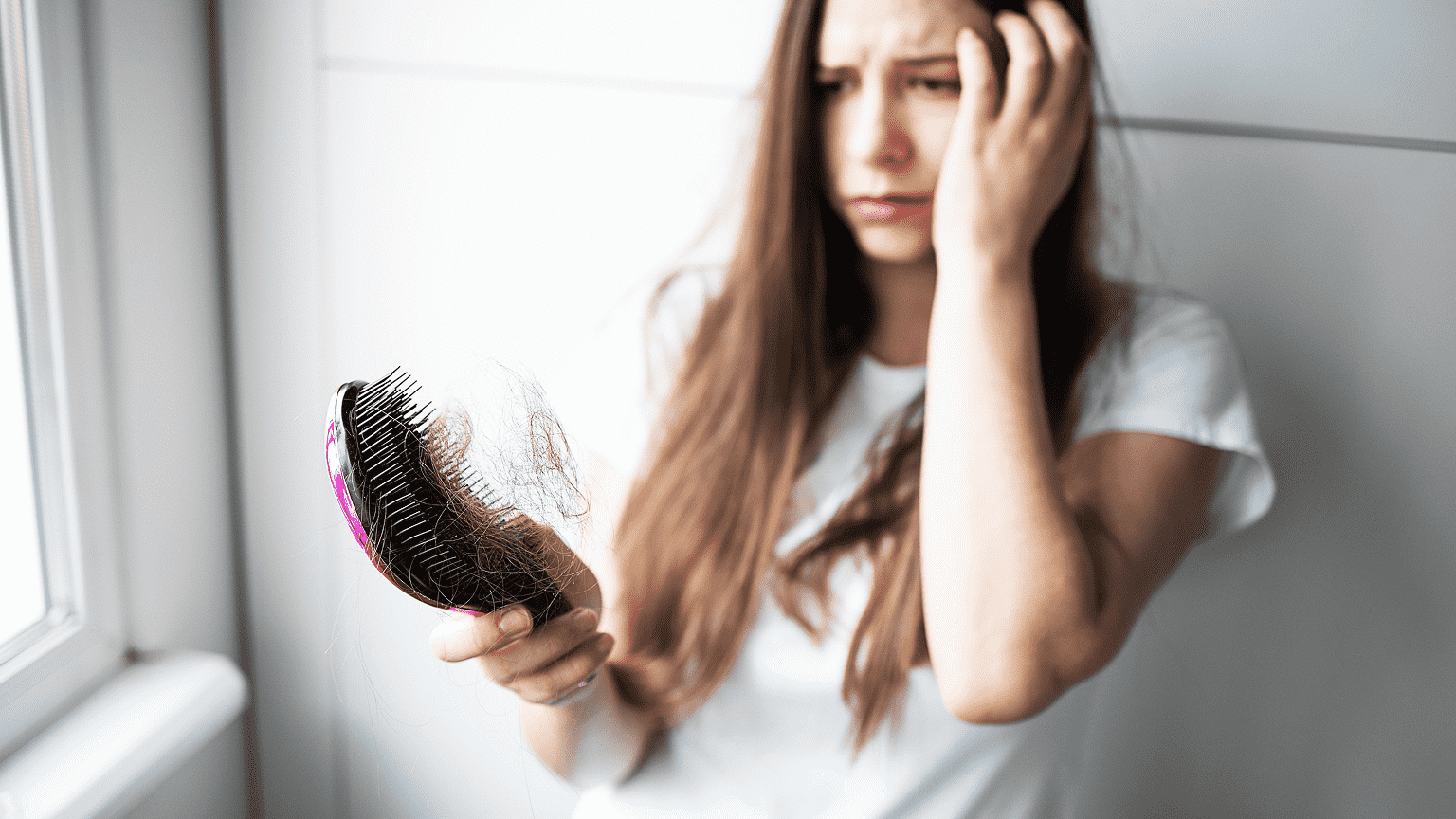Hair loss is a common problem among men and women. Genetics, hormonal changes, and lifestyle are common causes of hair thinning or shedding. However, an important cause that people often ignore is vitamin deficiency. “Which Vitamin Deficiency Causes Hair Loss?” is a common question asked by people who experience sudden hair loss without an apparent reason.
In this article, we shall explain the key vitamins that aid in the healthy growth of hair and how their lack contributes to hair loss. If you’re wondering which vitamin deficiency causes hair loss, understanding the role of these nutrients is important.
Why Vitamins Are Essential for Healthy Hair
A proper combination of vitamins and nutrients makes our hair strong, shiny, and healthy. A deficiency in key vitamins causes the weakening of hair follicles and leads to thinning, breakage, and, eventually hair fall. Knowing the lack of which vitamin causes hair fall can help you take preventive measures and restore your hair’s vitality.
Common Vitamin Deficiencies That Cause Hair Loss

Let’s first take a close look at the most common vitamin deficiencies that have been associated with hair fall:
1. Vitamin D Deficiency
Vitamin D is essential for the development of new hair follicles. Its deficiency has been clinically associated with autoimmune alopecia, causing severe hair loss. Low levels of Vitamin D disruption in the hair growth cycle may result in hair shedding prematurely. If hair fall is excessive, the deficiency of which vitamin causes hair fall might be due to insufficient Vitamin D.
Sources of Vitamin D:
- Sunlight exposure
- Fatty fish (salmon, mackerel)
- Fortified foods (milk, orange juice, cereals)
- Supplements (see doctor)
2. Vitamin B7 (Biotin) Deficiency
Biotin is one of the most famous vitamins for hair care. It boosts keratin synthesis, which forms your hair, skin, and nails. A hair fall with vitamin deficiency in biotin often results in brittle hair, breakage, and thinning.
Sources of Biotin:
- Eggs
- Nuts (almonds, walnuts)
- Whole grains
- Leafy greens
3. Vitamin C Deficiency
Vitamin C is an antioxidant that helps produce collagen, an essential protein for hair structure. It also enhances iron absorption, a mineral crucial for preventing hair loss. If you’re searching for which lack of vitamins causes hair fall, consider checking your Vitamin C levels.
Sources of Vitamin C:
- Citrus fruits (oranges, lemons)
- Strawberries
- Bell peppers
- Broccoli
4. Vitamin E Deficiency
Vitamin E enhances scalp circulation and encourages healthy hair growth. Its antioxidant properties help fight oxidative stress, which can lead to hair loss. Despite its crucial role, vitamin E is often overlooked when asking which vitamin deficiency causes hair loss.
Sources of Vitamin E:
- Nuts and seeds
- Spinach
- Avocado
- Sunflower oil
For individuals experiencing significant hair thinning despite addressing nutritional gaps, advanced options like PRP treatment London can help rejuvenate hair follicles and stimulate natural regrowth.
Signs and Symptoms of Vitamin Deficiency-Related Hair Loss
It is not easy to determine at times whether hair fall results from vitamin deficiency. But if you have these symptoms, you might be suffering from deficiency:
- A sudden increase in hair shedding
- Hair thinning all over the scalp
- Brittle hair with more breakage
- Slow hair growth
- Dry and itchy scalp
Consult a healthcare professional and get blood tests done to identify the lack of which vitamin is causing hair fall in your case.
Preventing Vitamin Deficiency Causative Hair Loss
A balanced diet rich in essential nutrients prevents hair loss due to vitamin deficiency. Most of the time, adjustments in diet with supplements can put your hair in a healthy position.
Here’s what you could do:
1. Take a Balanced Diet:
Concentrate on whole food such as fruits, vegetables, lean proteins and healthy fats
2. Keep an eye on your vitamins:
Regular checkups in a blood test keep the deficiency of vitamins under-diagnosis.
3. Doctor Consultant
If necessary, one can take supplements for vitamins like D, B7, or C after consulting with a doctor.
4. Hair Care:
Refrain from extreme heating, chemical, and tight styles.
Want to explore more practical solutions? Take a look at our comprehensive guide on how to stop hair loss.
When to Seek Professional Treatment
Suppose your hair loss persists even after improving your diet and lifestyle. In that case, it is high time to receive professional help from a dermatologist or trichologist to identify underlying issues and recommend appropriate treatments. In some cases, Hair Transplant Treatment may be the only viable way to regain hair density and increase confidence.
Role of Iron and Zinc for Hair Ends
Minerals such as iron and zinc play a significant role in preventing hair loss. One of the most common causes of hair thinning in women is a lack of iron. Low iron levels reduce oxygen to hair follicles, adversely affecting their function and causing shedding.
Zinc supports the oil glands surrounding hair follicles, thus creating a healthy scalp environment.
These essential minerals should not be forgotten while considering hair fall and vitamin deficiency.
Lifestyle Habits for Healthy Hair Growth
Other than vitamins and minerals, the following lifestyle changes can be taken to ensure healthy hair growth and prevent further hair loss:
- Stay Hydrated: Drink ample water to maintain moisture in your scalp.
- Exercise Regularly: Physical exercise ensures proper blood flow, which also helps your hair follicles.
- Manage Stress: Chronic stress may cause excessive hair shedding. Reduce stress through exercises like yoga or meditation.
- Don’t Smoke or Excess Alcohol: Both tend to weaken the hair follicle and can contribute to hair loss.
Is Vitamin Deficiency-Related Hair Loss Reversible?
Fortunately, many vitamin deficiency-induced hair loss is reversible. With the correction of the deficiency, you are likely to grow your hair back again. However, this recovery would depend on how long you had been experiencing hair loss due to the deficiency and how severe the deficiency was. When you have suffered hair loss for a longer time, both nutritional intervention and Hair Transplant Treatment will produce an ideal result.
Conclusion
Hair loss is distressing, but identifying the root cause helps resolve it effectively. If you ask yourself, “Which Vitamin Deficiency Causes Hair Loss?” First, understand how key nutrients, such as Vitamin D, B7 (Biotin), C, and E, can impact hair health. A well-balanced diet, along with timely intervention, could save you from further hair loss and restore your hair vitality.
Remember to consult a doctor for the proper diagnosis and personalised advice.
Once you know which vitamin deficiency causes hair fall, you are well within your rights to take steps to rectify the situation. You can recover and promote healthy hair growth through a proper diet or professional treatments.
FAQs
Vitamin D deficiency is among the most common causes of hair loss.
Sudden hair thinning, brittle hair, and slow hair growth may indicate a vitamin deficiency. Blood tests can confirm this.
Vitamin B7 (Biotin), Vitamin D, and Vitamin E deficiency can lead to thinning hair and breakage.
Yes, with proper diet, supplements, and timely treatment, hair loss due to vitamin deficiency is often reversible.
If your hair loss persists despite dietary improvements, consult a dermatologist. In severe cases, Hair Transplant Treatment might be an option.






